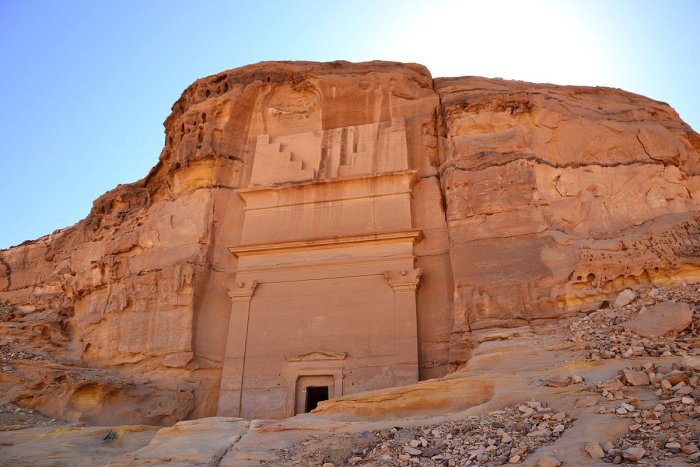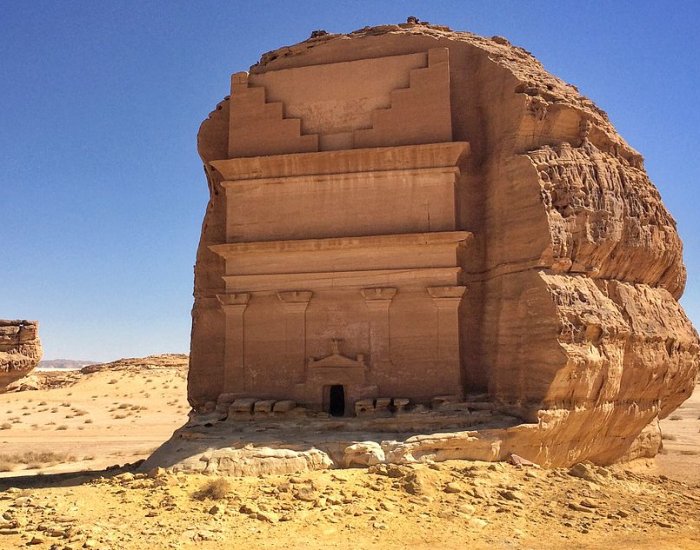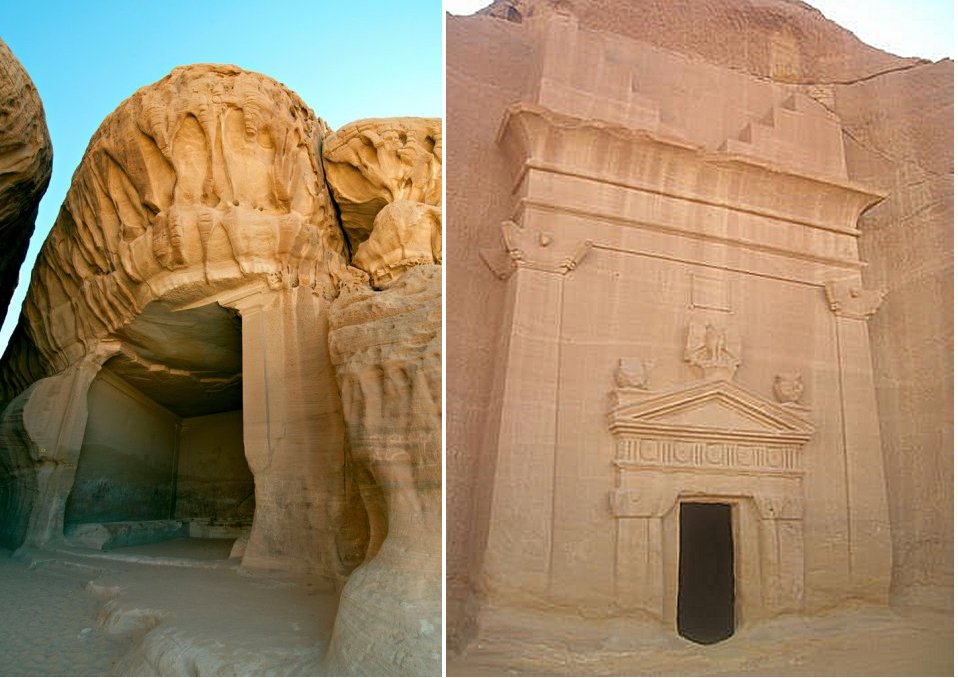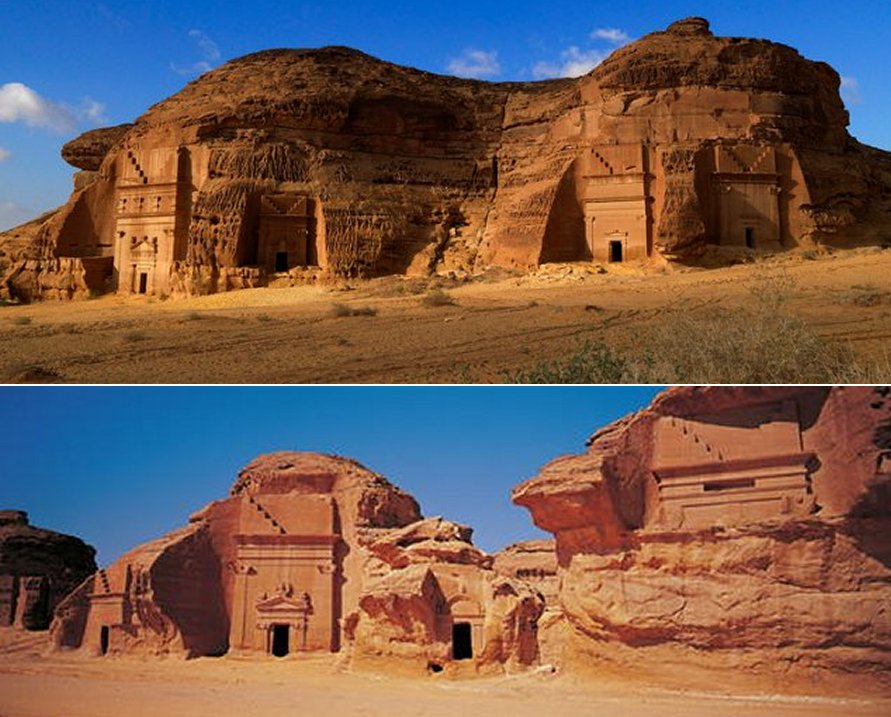Mada’in Saleh: Magnificent Timeless Rock-Cut Tombs And Monuments In The Desert
A. Sutherland - AncientPages.com - Located 20 km (12.4 mi) north of the Al-`Ula town, 400 km (248.5 mi) north-west of Medina, and 500 km (310.7 mi) south-east of Petra, in modern-day Jordan, the impressive ancient site Mada'in Saleh in Saudi Arabia continues to impress the modem world with its magnificent tombs and monuments that reflect the great skills of the masons of their time.
Madain Saleh, also called Al-Hijr or Hegra dates back to the Nabataean civilization.
This beautiful place is considered as one of the ´most important archaeological sites in Saudi Arabia and is called "The Capital of the Monuments".
The site constitutes the kingdom's southernmost and largest settlement after Petra, its capital.
With its 111 monumental tombs, 94 of which are decorated, and water wells, the site is an outstanding example of the Nabataeans' architectural accomplishment and hydraulic expertise.
Madain Saleh is the first World Heritage site in Saudi Arabia. Although historians are not complete certain where the Nabataean civilization came from, there is a strong possibility that they came from the Hejaz region of northwest Saudi Arabia and their history goes back thousands of years.
At its peak, the Nabataean Empire stretched from modern-day Yemen to Damascus and from western Iraq into the Sinai Desert, at least, according to some historians.
See also:
Unclear Purpose Of Mysterious Rock-Cut City Of Petra - Was It A Fortress Or Sacred City?
A Great Flood Destroyed The Mysterious Ancient City Of Petra – Evidence Has Been Found
Skilled Nabataeans Celestially Aligned Petra’s Wonderful Architecture
No one is really knows how large their empire was. Written records of the Nabataean kingdom are sparse as there are only a few surviving documents and scattered inscriptions and graffiti.
However, many thousands of graffiti carved onto rocks and canyon walls clearly demonstrate that almost every Nabataean could read and write, even the shepherds.
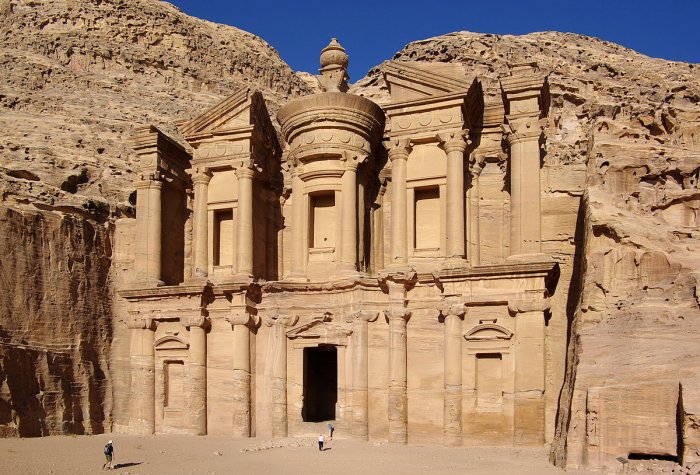
Ad Deir monastery in Petra, dated to 1st century. The elaborately ornamented façades, of the Nabatean kingdom resembles those of ancient site Mada'in Saleh located only 500 km (310.7 mi) south-east of Petra. Image credit: wikipedia
This makes us wonder why the Nabataeans did now write down their history.
According to historians, the Nabataeans were nomads, dwelling in tents in the desert.
They began as pastoral nomads, raising their sheep, goats, and camels in the desert as so many other Arabian tribes have done through the millennia. They also practiced oasis agriculture.
Yet, interestingly within a few short years they also built spectacular and awe inspiring monuments. The magnificent city of Petra is so impressive, that even today tourists stare in awe at the great ruins. Yet, this impressive city was hidden away in a cleft in the rock with access through a narrow crack in a mountain.
The Nabataeans watched the sky systematically and accurately and there are proof of their astronomical observations.
According to scientists who studied the Nabataean's palaces, temples and tombs these people were skilled astronomers. Great buildings were erected bearing in mind the equinoxes, solstices and other astronomical events that determined the Nabataean religion.
Mada'in Saleh is their second largest city. According to UNESCO "most of the monuments and inscriptions of the archaeological site of Al-Hijr date from the 1st century BCE and the 1st century CE. But the inscriptions in Lihyanite script and some recently discovered archaeological vestiges are evidence for human settlement as early as the 3rd or 2nd century BCE.
One-third of the tombs, which are amongst the largest, are clearly dated to between 0-75 CE.
Hegra was a major staging post on the main north-south caravan route. A secondary route linked it to the port of Egra Kome, according to a Greek-language source. Two recently discovered Nabataean sites on the shores of the Red Sea could in fact be this port."
The ruins of the town of Hegra lie on the plain some distance from their tombs.
Mada'in Saleh remains a timeless and truly beautiful ancient place.
Written by – A. Sutherland - AncientPages.com Senior Staff Writer
Copyright © AncientPages.com All rights reserved. This material may not be published, broadcast, rewritten or redistributed in whole or part without the express written permission of AncientPages.com
More From Ancient Pages
-
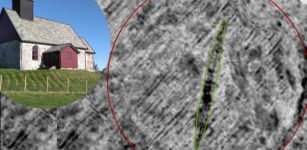 Edøy Discovery: Traces Of 1,000-Year-Old Ship Burial Detected In Norway
Archaeology | Nov 24, 2019
Edøy Discovery: Traces Of 1,000-Year-Old Ship Burial Detected In Norway
Archaeology | Nov 24, 2019 -
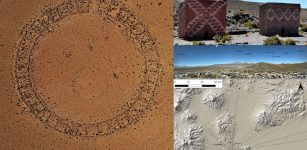 Mysterious Ancient Andean Waskiri Structure Built For Unknown Purpose Investigated By Scientists
Archaeology | Apr 14, 2023
Mysterious Ancient Andean Waskiri Structure Built For Unknown Purpose Investigated By Scientists
Archaeology | Apr 14, 2023 -
 500 Million Year-Old Fossils Solve A Centuries-Old Evolutionary Riddle
Archaeology | Nov 7, 2022
500 Million Year-Old Fossils Solve A Centuries-Old Evolutionary Riddle
Archaeology | Nov 7, 2022 -
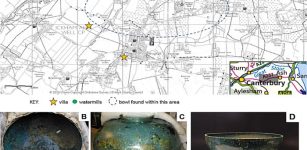 Modern Pesticide Accelerates Corrosion Of Ancient Roman Bowl
Archaeology | Oct 6, 2022
Modern Pesticide Accelerates Corrosion Of Ancient Roman Bowl
Archaeology | Oct 6, 2022 -
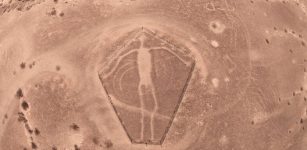 Cryptic North American Blythe Intaglios Reveal The Creator Of Life: Who Was This Unknown Being?
Featured Stories | Aug 23, 2014
Cryptic North American Blythe Intaglios Reveal The Creator Of Life: Who Was This Unknown Being?
Featured Stories | Aug 23, 2014 -
 Bible And Book Of Enoch Reveal Why Ancient Giant Bones Are Missing
Biblical Mysteries | Jul 21, 2018
Bible And Book Of Enoch Reveal Why Ancient Giant Bones Are Missing
Biblical Mysteries | Jul 21, 2018 -
 Mysterious Kolob – Does The Sacred Star Of The Mormons Exist?
Featured Stories | Feb 4, 2019
Mysterious Kolob – Does The Sacred Star Of The Mormons Exist?
Featured Stories | Feb 4, 2019 -
 Arachne – Spider Woman Who Challenged Goddess Athena And Was Punished
Featured Stories | Dec 5, 2018
Arachne – Spider Woman Who Challenged Goddess Athena And Was Punished
Featured Stories | Dec 5, 2018 -
 Sir Francis Walsingham: Spymaster, Politician And Trusted Adviser To Queen Elizabeth I
Featured Stories | Nov 25, 2019
Sir Francis Walsingham: Spymaster, Politician And Trusted Adviser To Queen Elizabeth I
Featured Stories | Nov 25, 2019 -
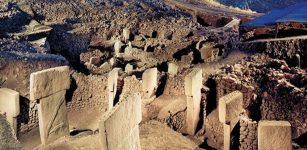 Ancient Astronomical Symbols At Göbekli Tepe Confirm A Comet Swarm Struck The Earth 11,000 B.C.
Archaeology | Apr 23, 2017
Ancient Astronomical Symbols At Göbekli Tepe Confirm A Comet Swarm Struck The Earth 11,000 B.C.
Archaeology | Apr 23, 2017 -
 On This Day In History: Courageous And Heroic Radio Rescue At Sea – On Jan 23, 1909
News | Jan 23, 2017
On This Day In History: Courageous And Heroic Radio Rescue At Sea – On Jan 23, 1909
News | Jan 23, 2017 -
 5,000-Year-Old Underground Partly Submerged City Discovered In Turkey’s Cappadocia
Archaeology | Jun 10, 2019
5,000-Year-Old Underground Partly Submerged City Discovered In Turkey’s Cappadocia
Archaeology | Jun 10, 2019 -
 New Study Challenges The Beginning Of Civilization
Archaeology | Apr 11, 2022
New Study Challenges The Beginning Of Civilization
Archaeology | Apr 11, 2022 -
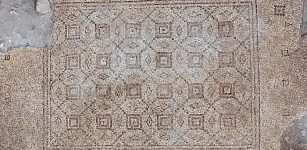 A 1,600-Year-Old Mosaic Accidentally Unearthed In Ancient City Of Yavne, Israel
Archaeology | Apr 26, 2021
A 1,600-Year-Old Mosaic Accidentally Unearthed In Ancient City Of Yavne, Israel
Archaeology | Apr 26, 2021 -
 The Wild Hunt – Danger Of Seeing The Phantom Army Of Odin
Featured Stories | Nov 7, 2021
The Wild Hunt – Danger Of Seeing The Phantom Army Of Odin
Featured Stories | Nov 7, 2021 -
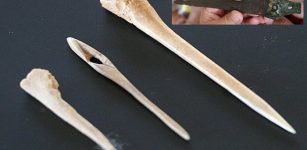 8,600-Year-Old Bone Needles Found In Denizli Closely Associated With Old Textile Tradition
Artifacts | Sep 2, 2020
8,600-Year-Old Bone Needles Found In Denizli Closely Associated With Old Textile Tradition
Artifacts | Sep 2, 2020 -
 On This Day In History: Edict Of Milan Is Signed – Persecution Of Christians Ends – June 13, 313 AD
News | Jun 13, 2016
On This Day In History: Edict Of Milan Is Signed – Persecution Of Christians Ends – June 13, 313 AD
News | Jun 13, 2016 -
 Stolen Antique Tamil Nadu Statues Have Been Returned By Britain To India
Artifacts | Sep 23, 2020
Stolen Antique Tamil Nadu Statues Have Been Returned By Britain To India
Artifacts | Sep 23, 2020 -
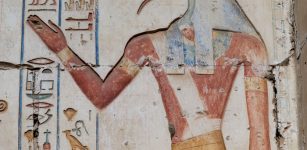 Thoth: Ancient Egypt’s Most Mysterious, Highly Venerated God Of Knowledge And Writing
Egyptian Mythology | May 24, 2017
Thoth: Ancient Egypt’s Most Mysterious, Highly Venerated God Of Knowledge And Writing
Egyptian Mythology | May 24, 2017 -
 Medieval Pilgrim’s Badge (‘Pilgrim’s Sign’) Depicting A Basilisk Dragon In A Circle Discovered In Southeastern Poland
Artifacts | Mar 5, 2024
Medieval Pilgrim’s Badge (‘Pilgrim’s Sign’) Depicting A Basilisk Dragon In A Circle Discovered In Southeastern Poland
Artifacts | Mar 5, 2024

